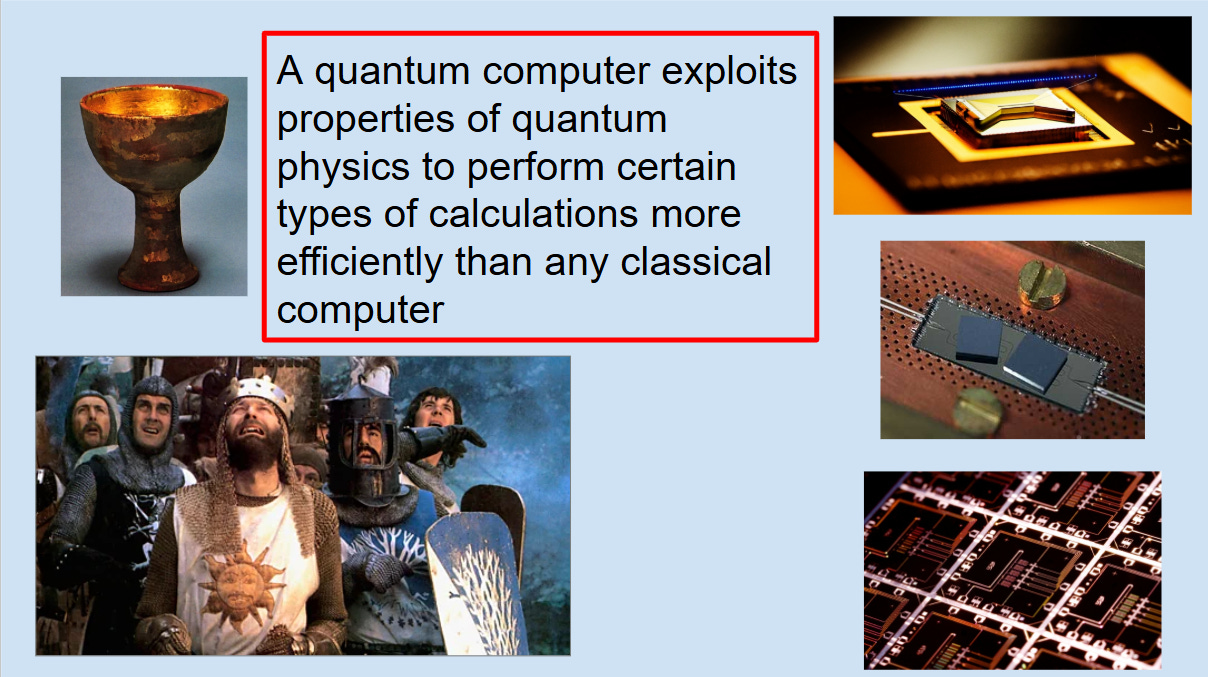Quantum Is Not the Answer to AI
A quick heuristic for when to stop listening
We’re doing the thing again— insert the meme from Watchmen with Dr. Manhattan on Mars— where Google claims to have reached a quantum-computing milestone, while a lot of other people in the field express skepticism about whether this particular result is really All That. The actual paper seems to be here, but when it comes to explaining what’s going on, that is not just “in the weeds,” it’s sunken in a kelp forest somewhere, possibly guarded by a kraken. I’m not in any kind of position to evaluate their claim on a technical level.
That said, the result has gotten enough press that it’s resurfaced some public conversations about quantum computing and its eventual applications, and that is something I’m a little more comfortable talking about. At least at a 30,000 foot overview sort of level— in fact, I just did a version of my “What Is a Quantum Computer?” talk for our adult education program, so I have a summary slide ready to hand for this:
Which brings me around to the proximate cause of this post, which is that I’ve had multiple conversations this week in which people mentioned the Google result and speculated about its eventual application to artificial intelligence. Whenever there’s one buzzy topic going in tech-y spaces, it has a tendency to accrete concepts from other fields, so in a moment with two buzzy tech-y topics, it was probably inevitable that they would collide and possibly merge. Which is why I have people asking me “Don’t we need quantum computers to make AI work?”
While I am not the least bit confident in my ability to understand and evaluate whatever Google just did with their quantum chip, I am confident enough in my understanding of basic quantum science to say that these two things have basically nothing to do with each other. Quantum computing as a real science is almost certainly not the key to unlocking artificial intelligence as an actual thing, and the “QC” that actually exists in the tech-y world of 2025 is very definitely not relevant for the “AI” that actually exists in the tech-y world of 2025 (scare quotes are part of the abbreviations in both cases, BTW).
These get mashed together because “QC” is usually sold on the basis of a computational speed-up— a sufficiently advanced quantum computer can solve problems that the best classical computers could not do in finite time— and one of the defining features of the roiling cauldron of linear algebra that’s currently sold as “AI” is the need for large amounts of computation to sift through the Bag of Words to generate an answer. If those are the things you know about those technologies, it seems logical to combine them: if we had “QC” we could do the calculations for “AI” super fast, and transcend to a higher plane of existence, or whatever.
The problem with this is that quantum computing is not a general-purpose system for speeding up any and all computations. It’s not that a quantum computer with enough qubits couldn’t run some classical application if you wanted to. Any collection of things with two states and a set of rules for flipping between them can be used to do any computation you could imagine. You absolutely could run the computations needed to, say, play Block Blast on a quantum computer, but then you could do the same computations with a bag of pennies, which would be about as useful.
Quantum computing is a method of speeding up certain types of computations by exploiting the wave nature of quantum states and the non-locality of quantum information. These properties allow you to reduce either the number of steps needed to reach an answer, or reduce the infrastructure required to run a computation, provided the question you’re asking is the right sort of thing. What exactly constitutes “the right sort of thing” is still a little vague and the subject of ongoing research, but generally seems to involve problems where you’re looking at collective properties— “What two numbers can I multiply together to generate this large number?” is the killer app in this case, which you can think of as exploring some collective feature of the set of all numbers smaller than the one you’re trying to factor1. That’s a case where the wave nature of quantum bits allows you to reduce the number of steps required to solve the problem. “How will this large collection of interacting quantum objects behave?” is another good question; there, the advantage comes from reducing the computational resources required to keep track of the individual properties of your quantum objects and the non-local correlations between them.
Most computational problems, though, don’t have the right structure to be sped up by quantum computing, and thus there’s no point in running them on a quantum computer. Particularly not with any of the “QC” technologies that exist today. In order to play Block Blast on a quantum computer, you would need to perform the same steps that you do to run it on a classical computer, only all of those steps would go achingly slowly because none of the technologies we have for “QC” can flip bits at anywhere close to the rate that we can flip bits in a classical computer.
“AI” as it currently exists is limited by the number of computational steps required to sift through the Bag of Words. Partly because of the classical nature of the algorithms, but also because of the sheer number of Words in the Bag. These are not problems that are obviously improved by being run on a tiny number of grindingly slow quantum bits rather than an assortment of the fastest GPUs you can source from a politically unreliable country2.
There are some kind of fanciful interpretations of the “AI” problem where you look at the network-y nature of the Bag of Words algorithms and say “Well, what if we made it quantum?” and maybe that’s an angle of attack. This essentially amounts to noting that “AI” as it currently exists is basically doing a shitload of linear algebra, and that quantum mechanics is inherently a shitload of linear algebra, so maybe they’re a natural fit. It’s not at all clear that this is the right kind of linear algebra problem that makes a quantum approach take fewer steps or require fewer resources, though. Even if it did, it would require orders of magnitude more qubits, and better qubits, than are currently available. And that’s before you even reach the dubiousness of the proposition that what circa-2025 “AI” is doing is actually “artificial intelligence” in a broader sense3.
So, I offer this quick and useful heuristic for anyone who needs it:
If anybody tells you that “QC” is the key to “AI,” you can stop listening to them.
As a bonus, I’ll throw in this older heuristic (which isn’t needed as much today as it was a few years ago):
If anybody tells you that “QC” is needed to extend Moore’s Law, you can stop listening to them.
Both of these flow from the same central fact: quantum computing is not a general-purpose method for speeding up any and all computations, it’s a powerful tool for speeding up a very narrowly constrained class of computational problems.
This should not be taken, by the way, as in any way disparaging the actual science of quantum computing. It’s an absolutely fascinating subject, and on a deep level is one of the crowning achievements of the history of science: we’ve learned that aspects of our universe are incredibly weird, and have found ways to exploit that weirdness for our own ends. It doesn’t get cooler than that.
But while quantum computing is amazing and we should continue to probe the contours of the weirdest bits of our universe and look for ways to exploit them, we also shouldn’t oversell this. In the very best imaginable case, quantum computing will be a specialized tool used to solve problems from a small number of classes, not a magical method for making everything work better. And “QC” as it currently exists is very, very far from that best case scenario.
To slightly recast the joke from the summary slide I screenshotted at the top of this, if quantum computing is the Holy Grail, “QC” in 2025 is very much in the position of the guys at lower left. There’s still a chance, though, somewhere down the road to be this guy:
Which is to say, if everything breaks just right, you may be able to get your hands on the Cup of Christ and use it to solve a limited class of problems (the bullet wound killing Dr. Jones Sr., the strained relationships within the Jones family). But even after that, it has to stay inside the cave.
So, there’s the latest version of my buzz-killing Take on quantum computing, which isn’t going to earn me fat consulting fees, alas. If it appeals to you, though, here’s a button:
(fat consulting fees not required, though skinny ones are appreciated). If you have questions or would like to quibble with my characterization of “QC” and “AI,” the comments will be open:
Credit where due: I first heard this framing of things from Shelby Kimmel, now at Middlebury, and immediately copied it for my own talks on the subject.
The Republic of China, the People’s Republic of China, the United States of America…
There’s a kind of fanciful interpretation of what constitutes actual intelligence that allows for quantum effects to play a role, but I am highly dubious about that. I know just enough about how fragile quantum effects are under laboratory conditions to be extremely skeptical that they’re playing a key role in an environment as uncontrolled as a living brain.




Spot on, your clear explanation always makes me wonder what realy conceptual leaps, beyond the quantum buzz, you think are actually needed to advance AI, and it’s always a pleasure to read your takes.
Good article! I think that most science reporting out there is over-the-top hype. We need more physicists speaking to the public against the hype.
There are a few terms that I'm always curious what each physicists means when they use them. One is 'particle' and another is 'quantum information'. Can you tell me what you mean by quantum information? I'm hoping you'll be fairly precise.